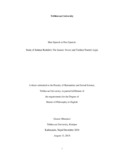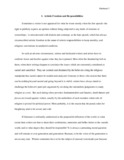Please use this identifier to cite or link to this item:
https://elibrary.tucl.edu.np/handle/123456789/3108| Title: | Hate Speech or Free Speech: Study of Salman Rushdie'sThe Satanic Versesand Taslima Nasrin'sLajja |
| Authors: | Bhattarai, Gaurav |
| Keywords: | Artistic Freedom;Hate Speech;Free Speech |
| Issue Date: | 2013 |
| Publisher: | Central Department of English |
| Abstract: | How the hate speech should be separated from the free speech and why the blasphemous laws should be banned to shield free thought and freedom of expression from any danger or damage? The dissertation examines the argument that whether blasphemous art should be publicly displayed, and if yes, in what manner artist are free and to what extent they should be responsible while exercising their artistic freedom. The dissertation argues against those who say blasphemy is an offence, an attack on religion and sacred, toaver that blasphemy shouldn't be understood merely on the moral and ethical lines, but through the contextual and philosophical understandings of the issue. Particularly, the dissertation criticizes the blasphemy laws, including fatwas and death threats issued against two writers--Salman Rushdie and Taslima Nasrin. Finally, the thesis discusses how the notion of blasphemy itself is the product of misunderstanding andmisreading the free speech as the hate speech. The thesis concludes that the line between aesthetics and ethics, between art and religion, should be drawn only by the rationalistic judgment of the contextual issues and for that artist's intention should be realized at first, before colligating it with the religious matters, ethical issues and falselyapprehending freedomofthought as a sacrilege and profanation. |
| URI: | http://elibrary.tucl.edu.np/handle/123456789/3108 |
| Appears in Collections: | English |
Files in This Item:
| File | Description | Size | Format | |
|---|---|---|---|---|
| COVER.pdf | 20.15 kB | Adobe PDF |  View/Open | |
| CHAPTER.pdf | 200.98 kB | Adobe PDF |  View/Open |
Items in DSpace are protected by copyright, with all rights reserved, unless otherwise indicated.
